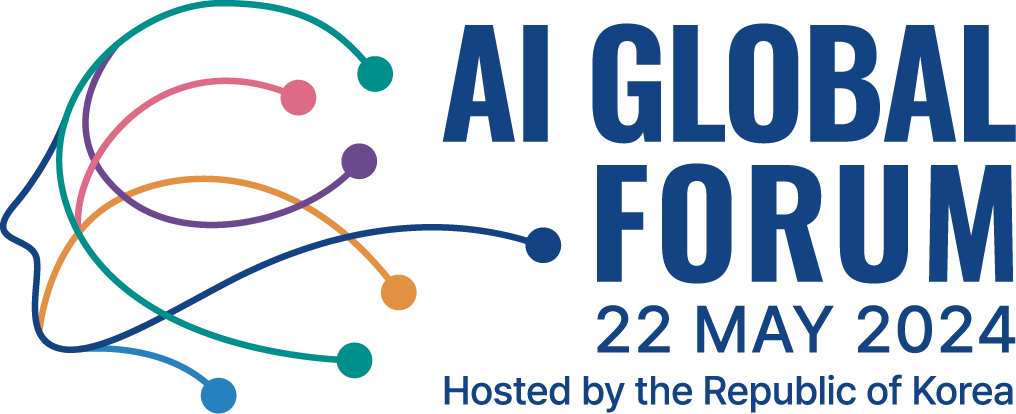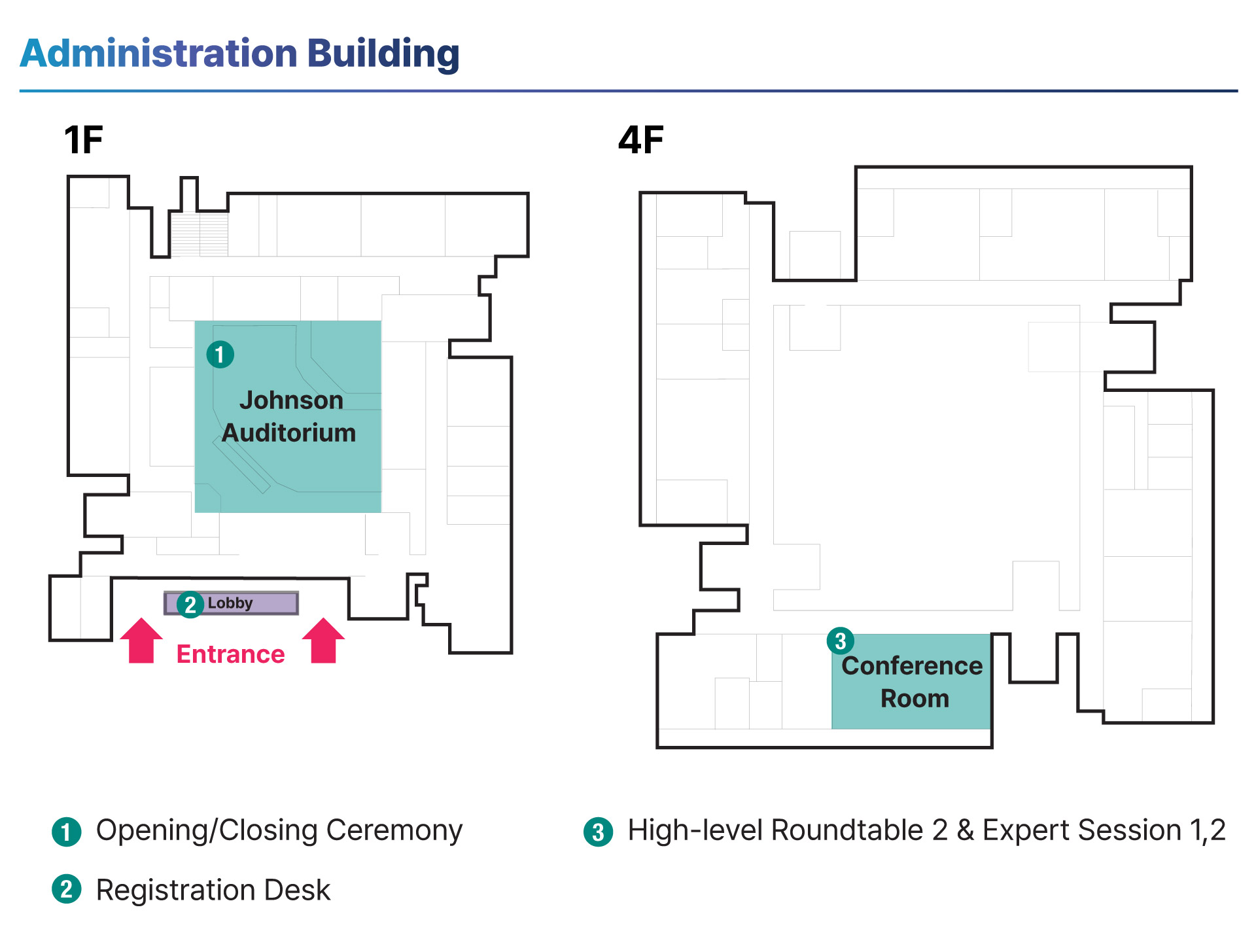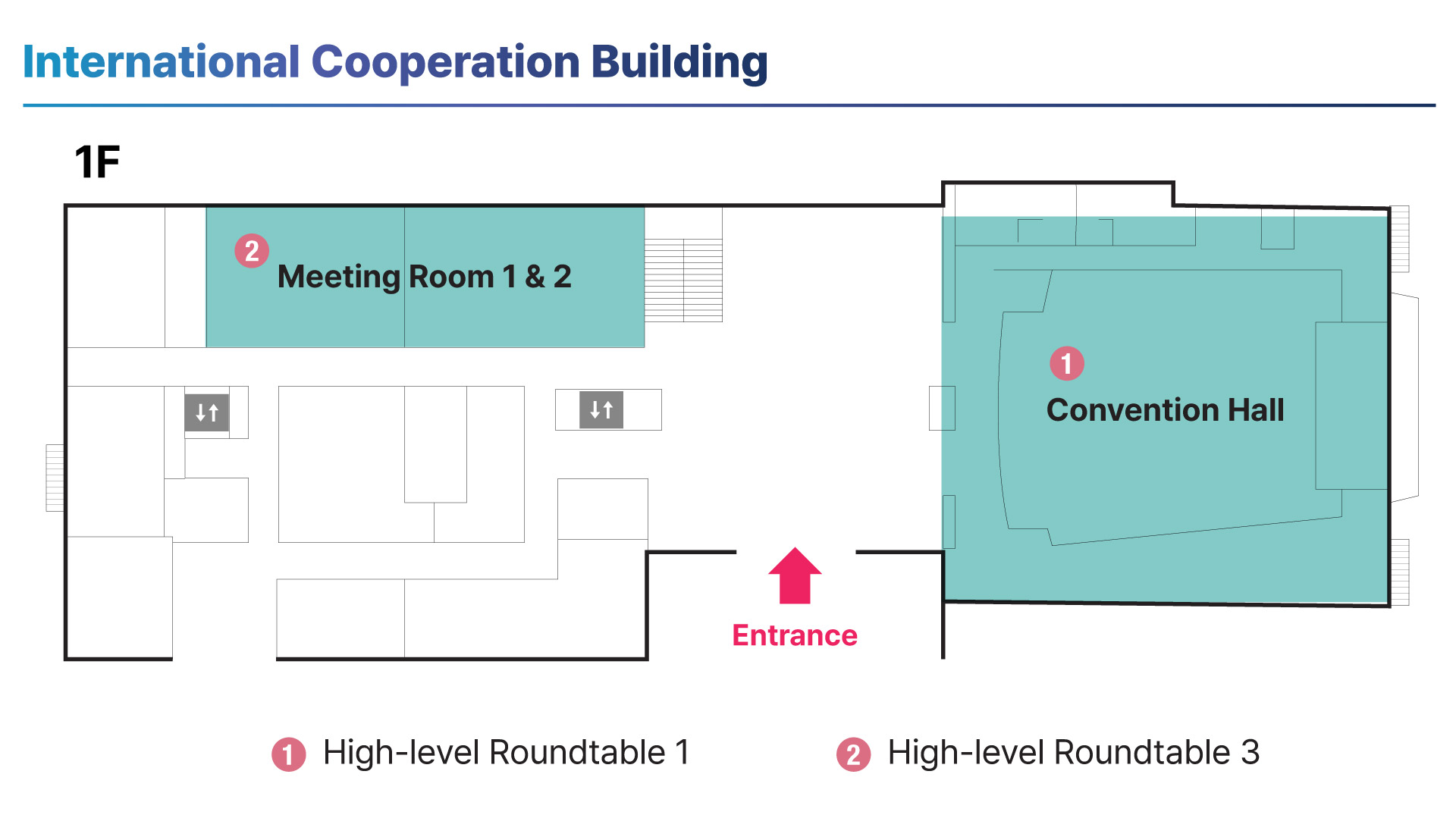Conference Room, Convention Hall, Meeting Room 1&2 2024-05-22 10:00-12:20
High-level Roundtables (Invited Only)
High-level Roundtables
Three high-level roundtables will be held in parallel in closed sessions, under the ChathamHouse Rules.
Session Description
· Date : May 22, 2024
High-level Roundtable 1
Exploring the Future of AI Innovation: Is an Open and Collaborative Model the Key?
This session aims to delve into the mechanisms through which we can actively promote the development of AI, particularly spotlighting two potential engines of innovation: open-source AI and open access databases. Open-source AI promises to democratize AI innovation by making advanced tools and algorithms accessible to a diverse group of stakeholders, from large corporations to individual developers.
This approach is said to not only accelerate technological advancement through collaborative contributions but also said to ensure a level of transparency that is paramount in today’s digital age. Yet, there are those who voice concern that open-source, high-performance, general-purpose AI models may potentially threaten national and public security. Central also to the discussion of innovation is the pivotal role of data governance framework.
Notably, governments need strategies for balancing the need for open-access databases to fuel AI innovation with the imperative of protecting individual privacy and ensuring data security.
The session will invite speakers from countries of differing regulatory approaches and industry landscapes, to share and compare their experiences on promoting open and collaborative models of innovation whilst addressing safety and privacy concerns.
High-level Roundtable 2
Comprehensive Safety Governance: Identifying and Addressing Full Spectrum of AI Risks
The potential risks associated with the development and deployment of AI have become a focal point for global concern. These risks range from privacy breaches to job market disruptions to potential catastrophic risks posed by advanced AI systems.
Addressing the full spectrum of AI-related risks can benefit from a collaborative, multidisciplinary approach that transcends national borders and industry sectors.
Moreover, a comprehensive AI risk management requires a more inclusive dialogue to ensure a coherent approach across regions.
The discussion will embark on identifying the key categories of AI risks, with a particular focus on gaps in the current discussions and examine potential conflicts between or fragmentation of governance initiatives.
High-level Roundtable 3
Sharing the Benefits of AI and Enhancing Inclusivity of Governance Framework
AI is transforming access to knowledge and information in all spheres, presenting a great potential to bring greater prosperity around the world.
However, if AI benefits only the few, it may only deepen global inequalities and disparities.
Korea, for its part has initiated efforts in technology-sharing and capacity -building. For example, starting this year, Korea is supporting the comprehensive digital transformation of ASEAN countries under the Korea-ASEAN Digital Innovation Flagship Project.
This is a project that supports establishment of data ecosystems, construction of high-performance computing systems, education and training, and application of AI to carbon neutrality and healthcare. Korean AI firms also play an important role in bridging the gap in AI divide.
Many of them are developing AI services to accommodate more diverse languages and cultures.
The session explores what key players are doing around the world, with a particular focus on the positive use cases of AI and explores the potential for developing a far more inclusive governance framework.
Chairs
· Chrysoula Zacharopoulou, Secretary of State for Development and International Partnership of France
· Janil Puthucheary, Senior Minister of State at the Ministry of Communications and Information, Minister-in-charge of the Government Technology Agency, and Ministry of Health of Singapore
· Michelle Donelan, Secretary of State for Science, Innovation and Technology of UK
Speakers
(In alphabetical order)
· Abdullah bin Sharaf Alghamdi, President of the Saudi Data and AI Authority of Saudi Arabia
· Abhishek Singh, Additional Secretary of Ministry of Electronics and IT of India
· Aidan Gomez, CEO of Cohere
· Akiva Tor, Ambassador of Israel to the Republic of Korea
· Alice Oh, Professor of KAIST of Korea
· Amandeep Singh Gill, Secretary General's Envoy on Technology of UN
· Andrew Ng, Managing General Partner, AI Fund
· Arthur Nelson, Deputy Director of the Technology and International Affairs Program of Carnegie Endowment for International Peace
· Bae Soonmin, Chief Responsible AI Officer of KT
· Benedikt Wechsler, State Secretary of Federal Departmnent of Foreign Affairs, Head of Division for Digitalisation of Switzerland
· Choi, Kyoungjin, Professor, Director of Center for AI Data and Policy of Gachon University
· Christina Montgomery, Chief Trust Officer of IBM
· Craig Ramlal, UN AI Advisory Body, Head of the Control Systems Group, University of the West Indies at St. Augustine of Trinidad and Tobago
· Elizabeth Kelly, Director of the U.S. Artificial Intelligence Safety Institute of USA
· Francis Bilodeau, Associate Deputy Minister of Innovation, Science and Industry of Canada
· Gregory C. Allen, Director of Wadhwani Center for AI and Advanced Technology of CSIS
· Ha, Jung-Woo, Head of NAVER AI Lab
· Ivan John E. Uy, Secretary of Information and Communication Technology of Philippines
· Jack Clark, Co-founder of Anthropic
· Jason Kwon, Chief Strategy Officer of OpenAI
· Jerry Sheehan, Director, Directorate for Science, Technology and Innovation of OECD
· Kang, DoHyun, 2nd Vice-Minister of Ministry of Science and ICT of Korea
· Kim, Soohyun, Director of UNESCO Regional Office in Bangkok
· Ko, Haksoo, Chairperson of Personal Information Protection Commission of Korea
· Lee, Honglak, Chief Scientist of AI of LG AI Research
· Lee, Kyoung Jun, Professor of Kyung Hee University of Korea
· Lee, Sang-Ho, Chief AI Officer of Kakao
· Lucilla Sioli, Director for AI and Digital Industry DG CONNECT European Commission
· Marc Raibert, Executive Director of the AI Institute and Founder of Boston Dynamics
· Mayte Ledo, Secretary of State for Digital Transformation and Public Function of Spain
· Max Fenkell, Head of Goverment Relations of Scale AI
· Mohammed Al Mannai, Minister of Communications and Information Technology of Qatar
· Murakami Akiko, Executive Director of Information-technology Promotion Agency of Japan AI Safety Institute
· Natasha Crampton, Chief Responsible AI Officer of Microsoft
· Nezar Patria, Vice Minister of Communication and Information Technology of Indonesia
· Paula Ingabire, Minister of ICT and Innovation, Rwanda
· Robert F. Trager, Director of Oxford Martin AI Governance Initiative, Blavatnik School of Government, University of Oxford
· Rob Sherman, Vice President and Deputy Chief Privacy Officer of META
· Sabastian Niles, President and Chief Legal Officer of Salesforce
· Seth Center, Deputy Envoy for Critical and Emerging Technology, Department of State of USA
· Stefan Schnorr, State Secretary of Federal Minsitry for Digital and Transport of Germany
· Tom Lue, Vice President of Google DeepMind
· Tehilla Shwarts Altshuler, Senior Fellow of Israel Democracy Institute
· Tony Gaffney, CEO of Vector Institute
· Touradj Ebrahimi, Professor of École Polytechnique Fédérale de Lausanne of Switzerland
· Ylli Bajraktari, CEO of Special Competitive Studies Project



